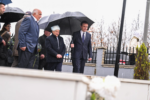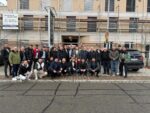Kosovo’s Prime Minister, Albin Kurti, who is seeking a new term in office, promised this week a budget of over one billion euros for the country’s Security Force and reiterated that Kosovo will build its own ammunition and military drone factory.
Tim Less from the University of Cambridge believes that Kosovo must take two key steps to maintain the attention of its allies.
“One is active lobbying in the West, promoting the idea that Serbia is a threat and must be stopped. And secondly, to invest in its own security, by building its own army, building its own stockpiles of armaments, and so on—in case it needs to face Serbia directly and without external help,” says Less.
Furthermore, with an American administration signaling less involvement in European matters, the Kremlin may feel less pressure to act in either Ukraine or the Balkans, according to Professor Less.
“The inauguration of Donald Trump on January 20th was like a bomb that exploded in international relations. Everywhere you look, you see some sort of influence from Trump,” he said.
In this uncertain climate, the challenge for Kosovo and the Western Balkans, in general, seems clear: stay on the radar, or risk being sidelined from the geopolitical game, say analysts.
However, this requires a delicate balance between internal and international interests—something that is never easy, especially in a region like the Balkans.







